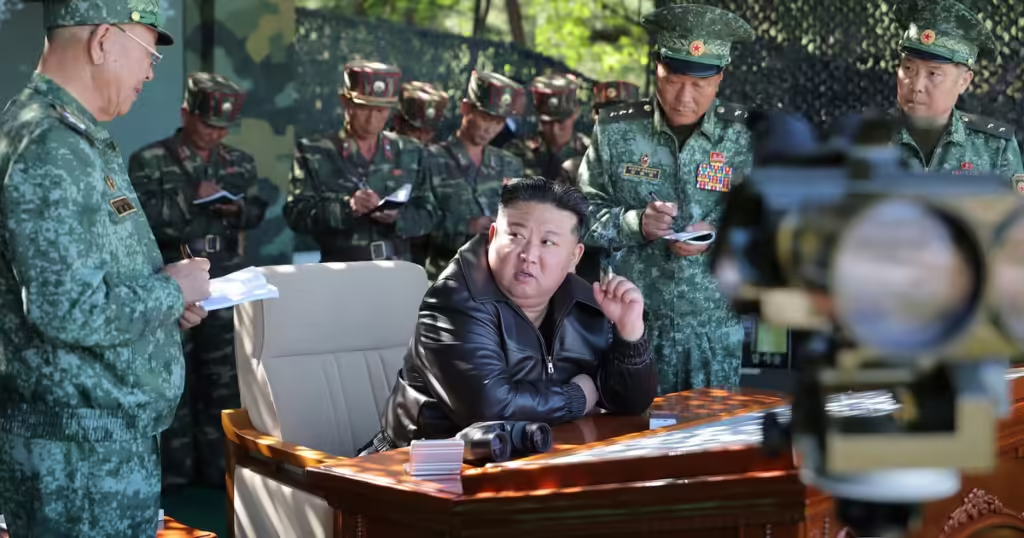North Korea’s Secret Weapon: 12,000 Soldiers Deployed to the Russia-Ukraine War
(Feat. Kim Jong-un, Putin, South Korea, the U.S., Global Tension, Power Game)
What happens when one of the world’s most isolated regimes sends thousands of elite soldiers into one of the largest conflicts of our time? North Korea has just deployed 12,000 of its most feared troops to Russia, raising the stakes in the Russia-Ukraine war—and potentially reshaping global military dynamics. This move begs the question: What does North Korea stand to gain from this dangerous alliance?
1. North Korea’s involvement in the conflict is now official.
2. North Korea is reportedly sending 12,000 troops from four brigades of their 11th Corps, also called the “Storm Corps,” to Russia.
3. The Storm Corps started out as the Special 8th Corps.
4. The Special 8th Corps was formed in 1969, based on the unit that attempted to raid South Korea’s Blue House (presidential residence) in 1968.
5. In 1983, North Korea expanded this into what’s now the 11th Corps.
6. The 11th Corps is trained to infiltrate South Korea, destroy military bases, and disrupt operations through guerrilla warfare in case of war.
7. It’s considered an elite unit in North Korea’s military.

8. The 11th Corps is made up of about 40,000 soldiers, but they’re sending 12,000 of them to Russia.
9. The first group of 1,500 soldiers has already gone to Russia, with another 10,000 expected soon.
10. Some reports say these troops might not perform well because they’re not used to modern warfare.
11. But is that really true?
12. North Korean soldiers serve for 10 years.

13. Even though their equipment is outdated, they’ve been trained for years.
14. These highly trained special forces troops are just moving to Russia, where they’ll be armed with Russian weapons.
15. They might end up being a stronger force than people think.
16. It’s true that North Korea’s military has supply issues, which weakens their overall capability.
17. But the 11th Corps is part of North Korea’s top units, and they still get steady supplies.
18. A big question is whether North Korea will stop at sending just 12,000 soldiers.

19. North Korea has around 1.2 million “active” soldiers.
20. Even though North Korea’s population is half of South Korea’s, they maintain over twice the number of soldiers, compared to South Korea’s 550,000.
21. Sending 12,000 soldiers is only about 1% of their total force, so they could easily send more if they wanted to.
22. Weapons and supplies shouldn’t be a problem.
23. The soldiers will just move to Russia, get new Russian weapons, and Russia will take care of the logistics.
24. Recently, North Korea has been tearing up railroads and adding obstacles on roads, including symbolic cross-border links between South Korea, like the Gyeongui Line.

25. This might be to account for their military being temporarily weakened while these elite troops are away in Russia.
26. There’s no such thing as a free lunch.
27. Kim Jong-un probably secured a big deal in exchange for sending these troops.

28. Aside from any political agreements, the soldiers are likely earning a decent paycheck.
29. Regular Russian soldiers fighting in the war are getting paid around 4 million won (about $3,000 USD) per month.
30. Mercenaries from groups like Wagner are said to earn more than double that.
31. North Korean soldiers will probably get paid somewhere between regular soldiers and mercenaries.
32. Last year, North Korea’s total exports amounted to less than around $300 million USD.
33. If these North Korean soldiers stay in the war for just six months, they could bring back more money than the country earns in an entire year of exports.
34. There could also be military advantages for North Korea.
35. These troops will get real combat experience and return home fully armed with Russian weapons.

36. If North Korea also receives additional military support as part of the deal, it could significantly strengthen their military.
37. From the perspective of other nations (excluding Russia and North Korea), the best-case scenario would be for North Korean soldiers to be worn down as much as possible in the Russia-Ukraine war, weakening both North Korea and Russia militarily.

Alphazen Insights

Tensions are flaring across the globe—China eyeing Taiwan, the brutal Ukraine-Russia war, chaos in the Middle East, and the ever-present hostility between North and South Korea. With the U.S. election just weeks away, the stakes couldn’t be higher. We’re standing at a crossroads.
The world feels like it’s on the brink, and it’s not just military battles being fought. Economic struggles are part of this global power game, and the fallout could be felt everywhere.
The next few weeks will be crucial in determining which direction we head. Let’s hope the world chooses stability over chaos—because the clock is ticking, and the stakes are too high to ignore.
Discover more from Alphazen Dynamics
Subscribe to get the latest posts sent to your email.




